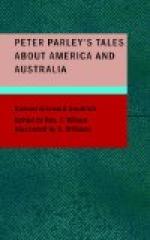The settlement of St. Sebastian, however, had been broken up, the Spaniards having suffered much from the repeated attacks of the natives, who would no longer patiently submit to their unjust treatment.
Soon after Enciso arrived at Carthagena he was joined by Pizarro, with the wretched remains of the colony; he determined nevertheless, to continue his voyage to the settlement.
Upon his arrival there he found Pizarro’s account was too true, for where St. Sebastian had stood, nothing was to be seen but a heap of ruins.
Here misfortune followed misfortune, his own ship was wrecked and then he was attacked by the natives.
In despair at these disasters Enciso was at a loss what to do, or where to go, when Balboa advised him to continue his course along the coast in Pizarro’s little vessel.
He stated that he had once before been on an expedition in this same gulf, and on the western side he well remembered an Indian village, on the banks of a river, called by the natives Darien.
Enciso pleased with Balboa’s advice, resolved to take possession of this village, and to drive out all the Indians.
Arrived at the river, he landed his men, and, without giving the unfortunate people of the village any notice, he attacked them, killed several, drove the rest out, and robbed them of all their possessions.
He then made the village the chief place of his new government, and called it Santa Maria del Darien. Balboa assisted in this work of cruelty and injustice.
The Spaniards had not been long here when they became tired with Enciso, and they refused to obey him, and sent him off in a ship to Spain. Upon his departure, Balboa took the command.
In one of his expeditions into the interior parts of the country in search of gold, he first heard of a sea to the west, as yet unknown to Europeans.
He had received a large quantity of gold from an Indian cazique, or chief, and was weighing it into shares for the purpose of dividing it among his men when a quarrel arose as to the exactness of the weight.
One of the sons of the Indian cazique was present, and he felt so disgusted at the sordid behaviour of the Spaniards that he struck the scales with his fist and scattered the glittering gold about the place.
[Illustration]
Before the Spaniards could recover from their astonishment at this sudden act, he said to them, “why should you quarrel for such a trifle? If you really esteem gold to be so precious as to abandon your homes, and come and seize the lands and dwellings of others for the sake of it, I can tell you of a land not far distant where you may find it in plenty.”
“Beyond those lofty mountains,” he continued, pointing to the south, “lies a mighty sea, all the streams that flow into which down the southern side of those mountains, abound in gold, and all the utensils the people have, are made of gold.”




